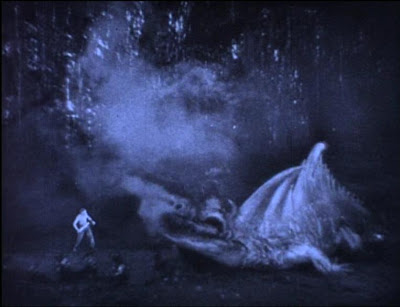
Director: Raoul Walsh
Synopsis: A thief, while stealing items from a palace, falls in love with the princess. She is choosing a husband the very next day. The thief tricks his way into the group of potential hubands until his identity is uncovered. The princess had all ready decided the thief was the one for her (through fortune telling) comes up with a quest for the remaining princes to bring the rarest treasure within the next seven moons. The thief naturally chooses to go for the quest as well.
The Mongol suitor has decided to take over Bagdad by winning the quest or force. When the remaining suitors return, the princess and her father haven't yet decided on the winner. The Mongol chooses to take over with the city. The thief returns with his treasure which is basically some sort of box with wishing powder or something. He uses it to save the day and he wins the girl.
Review: I spent a good deal of time while watching The Thief Of Bagdad mulling over if this qualified as derogatory toward the people and cultures of the Arabian Peninsula. The movie is not actively negative, but it felt like P. T. Barnum humbugging an oddity supposedly found in the deepest deserts of Arabia. Imagine an Iraqi movie about the Old West without a single white actor and everyone is portrayed like Johnny Appleseed meets Pecos Bill. That's how I imagine an Baghdad citizen reacting when they see this movie. So, take this for what it is.
What it is is pure entertainment. There is no message here. There are no ulterior motives. Drawing a line from this to the summer blockbuster phenomenon is not difficult because of this. The template for every contender for biggest hit of the summer--take everything you've seen before and make it bigger--is right here. Blaming Douglas Fairbanks for the sins of modern day Hollywood executives is unfair and rather mean.
Douglas Fairbanks, with whom I am unfamiliar other than uncredited "Man On Horse" from Intolerance, was the pre-Errol Flynn swashbuckling go to guy. He also wrote, produced and starred in this which I've learned is not as recent a convention in film as I thought. Imagine a film made to capitalize on what swashbuckling stars do best, then set it Bagdad. This is the movie playing in your head and it's all here.
For all the greatness that Douglas Fairbanks stuffed into this film--there are a lot of it--the best thing here is the set design. Very few movies are made by their sets (see pictures below - the sets really are that big and took six and one half acres to build). This may be the only one or it is the only one I can think of. The sets are a spectacle by themselves and the film would have lost its power if production designer William Cameron Menzies were reigned in some.
What it is is pure entertainment. There is no message here. There are no ulterior motives. Drawing a line from this to the summer blockbuster phenomenon is not difficult because of this. The template for every contender for biggest hit of the summer--take everything you've seen before and make it bigger--is right here. Blaming Douglas Fairbanks for the sins of modern day Hollywood executives is unfair and rather mean.
Douglas Fairbanks, with whom I am unfamiliar other than uncredited "Man On Horse" from Intolerance, was the pre-Errol Flynn swashbuckling go to guy. He also wrote, produced and starred in this which I've learned is not as recent a convention in film as I thought. Imagine a film made to capitalize on what swashbuckling stars do best, then set it Bagdad. This is the movie playing in your head and it's all here.
For all the greatness that Douglas Fairbanks stuffed into this film--there are a lot of it--the best thing here is the set design. Very few movies are made by their sets (see pictures below - the sets really are that big and took six and one half acres to build). This may be the only one or it is the only one I can think of. The sets are a spectacle by themselves and the film would have lost its power if production designer William Cameron Menzies were reigned in some.

 The sets are not the only thing of note because there are some special effects that work to varying degrees (see picture below). Overall, this movie accomplishes exactly what it set out to do by keeping me entertained except I do think it should have been a bit shorter. There really isn't more to say than that.
The sets are not the only thing of note because there are some special effects that work to varying degrees (see picture below). Overall, this movie accomplishes exactly what it set out to do by keeping me entertained except I do think it should have been a bit shorter. There really isn't more to say than that.
Final note: Why do the intertitles lapse into Jacobian English occasionally? Methinks "thou" wasn't used much in ancient Iraq.
Score: 8/10
No comments:
Post a Comment